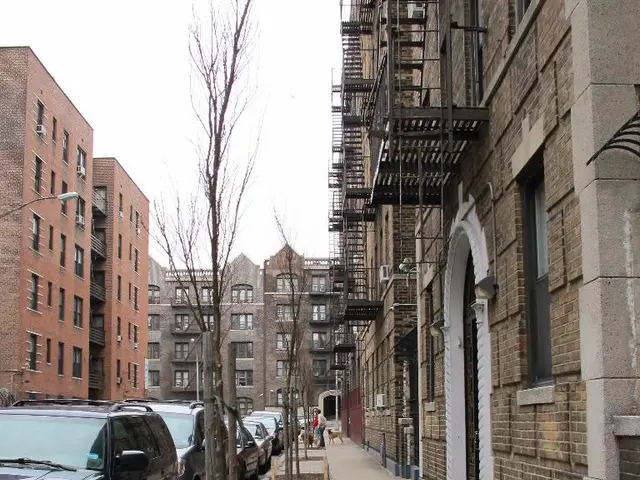Dementia Support Groups: A Home for Those Forgetful
Millions of Germans struggle with dementia. Living together in group homes could offer both care and a sense of independence for those affected, while also benefiting family members who face increasing care responsibilities.
Six to twelve elderly individuals reside in these group homes, where forgetfulness about daily tasks or remembering family members' names is common. This is a daily reality for those dealing with dementia. Group homes may provide a more independent and suitable care environment for the growing number of dementia patients in Germany.
The Growing Demand for Dementia Care
According to the Federal Ministry for Family, Senior Citizens, Women, and Youth (BMFSFJ), approximately 1.8 million Germans are currently living with dementia. By 2050, this number could rise to 2.8 million. As the population ages, dementia prevalence increases.
Addressing this growing demand for care is a challenge for the healthcare system. People with dementia require sensitive, consistent, and familiar care environments, which may not always be possible in traditional care institutions.
Group Homes as a Care Solution
Ambulatory care services provide care and support for those with care needs in their own homes. Group homes offer a more intensive level of care around the clock.
Johanna Grünhagen, coordinator for group home support in dementia group homes for the Alzheimer Society in Hamburg, explains the advantages of group homes: "For most people with dementia, this is the best option because they have a different care model compared to those in a standard care setting."
Providing a Semblance of Home
Residents of group homes have private rooms or shared living spaces. The Alzheimer Society supports the establishment of dementia group homes in Hamburg and provides assistance in finding housing and advisory support to families.
The dementia group home concept emphasizes collaboration among family members while ensuring intensive around-the-clock care. Shared responsibilities among family members help distribute the organizational burden.
The concept holds great promise for both residents and family members. Grünhagen states, "It's a bit like staying at home, but with better care and more people to help." Many residents seem rejuvenated after moving to group homes, with families often transferring loved ones from other care institutions to ensure better care.
Intensive Care as a Key Benefit
The intensive care provided by group homes can alleviate family members' caregiving responsibilities. Birgit Sgonina, who founded a dementia group home in Hamburg-Altona for her mother, sees this as a significant advantage: "They are not just fed, clothed, and kept clean; they receive care, engagement, and emotional support." This crucial difference made her feel more relaxed from day one after her mother moved in.
After her mother's death, Sgonina continues to be involved in the group home as a "house mother," volunteering twice a week to socialize with the residents, read them stories, listen to music, and take them for walks.
Alternative Living and Care Options for the Elderly
Dementia group homes are part of new living options for the elderly beyond traditional care institutions. These alternatives include community-based care homes, self-managed care homes, and senior living facilities.
While these options differ in their specifics, they share a focus on preserving privacy and some level of independence, while also offering suitable care and community support.
Other alternative living options for the elderly that have grown in popularity over the years include multi-generational homes, "living for help" arrangements, and senior living apartments with communal facilities and on-demand support.
Group Homes May Be More Expensive than Nursing Homes
Group home care comes with visible financial costs, as the prices for residents are often higher than those in traditional care institutions. This is primarily due to the lack of capped fees for individual contributions, unlike in nursing homes.
The dementia group home in Hospital Street in Altona, founded by Sgonina, provides monetary estimates on their website: approximately 600 euros for rent, 415 euros for household expenses, and individual care costs starting at 3,500 euros per month, with a subsidy of the care insurance contribution. The group home advises self-paying individuals that the costs "may eventually eat into your inheritance." The average self-payment for long-term care in Hamburg is approximately 3,089 euros per month.
Securing a place in a dementia group home can be challenging, as there are waiting lists in many places. Decisions about new residents are made collectively by the families of existing residents. Prospective residents and their families should be a good fit for the group home and have a cooperative working relationship with the other families involved. Interpersonal issues among residents and difficulties managing group dynamics can affect the care provided and the functioning of the group home.
Challenges Persist in the Care System
Even with alternatives like dementia group homes, the care system faces several challenges. In Hamburg, for example, several nursing home closures are planned due to difficulties in recruiting and retaining qualified staff, despite increasing demand.
The Hamburg senate recently announced changes to the care staffing quota in nursing homes, lowering the required proportion of qualified staff from 50% to as low as 40%, depending on the quality of care provided in specific facilities. This change allows nursing homes with high-quality care to reduce their staffing ratios.
Lack of investment in the social sector, coupled with the increased care demands posed by an aging population, pose challenges for the future of care provision in Germany. Grünhagen advocates for more support for alternative care concepts, stating that they may become increasingly important in light of demographic changes and staff shortages.
- Group homes may offer a more appropriate care environment for the increasing number of dementia patients in Germany.
- Ambulatory care services cater to those with care needs at home, while group homes provide a more intensive level of round-the-clock care.
- Group homes can help alleviate family members' caregiving responsibilities for their loved ones with dementia.
- Grünhagen believes that dementia group homes are the best option for most people with dementia due to their unique care model.
- Group homes offer residents private or shared living spaces, and the Alzheimer Society in Hamburg helps families find housing and provides advisory support.
- Collaboration among family members is key to the success of dementia group homes, ensuring intensive around-the-clock care.
- The advantages of group homes include better care, emotional support, and a sense of rejuvenation for residents.
- Traditional care institutions may not provide sensitive, consistent, and familiar care environments that people with dementia require.
- The intensive care provided by group homes can free up family members' time and reduce the caregiving burden.
- Dementia group homes are one of various new living options for the elderly, including community-based care homes and senior living facilities.
- These alternative living options prioritize privacy, independence, and community support for the elderly.
- Multi-generational homes, "living for help" arrangements, and senior living apartments with communal facilities and on-demand support are other popular options for the elderly.
- Group home care can be more expensive than care in traditional institutions due to the lack of capped fees for individual contributions.
- The expenses of group home care, such as rent, household expenses, and individual care costs, may eat into one's inheritance.
- Securing a place in a dementia group home can be challenging, with waiting lists in many places.
- Decisions about new residents are made collectively by the families of existing residents.
- Interpersonal issues among residents and difficulties managing group dynamics can affect the care provided and the functioning of the group home.
- Nursing home closures are planned due to staffing challenges in the care system.
- The Hamburg senate is implementing changes to nursing home staffing quotas, lowering the required proportion of qualified staff.
- Lack of investment in the social sector poses a challenge for the future of care provision in Germany.
- Grünhagen supports more investment in alternative care concepts like dementia group homes.
- Climate change may indirectly impact public health by exacerbating chronic diseases like cardiovascular diseases and respiratory conditions.
- Mental health is an essential aspect of overall health and wellness, including autoimmune disorders, skin conditions, and neurological disorders.
- CBD has gained popularity as a treatment for various medical conditions, including anxiety, pain, and inflammation.
- Eye health is critical in maintaining quality of life, with conditions such as macular degeneration and cataracts affecting millions worldwide.
- Hearing loss is a common issue among the aging population, impacting communication, cognitive functioning, and overall well-being.
- Mental health initiatives in the workplace have become increasingly important in promoting wellness and productivity for employees.
- Therapies and treatments for chronic diseases, cancer, and digital health technologies also fall under the umbrella of health and wellness.








